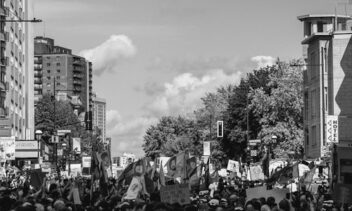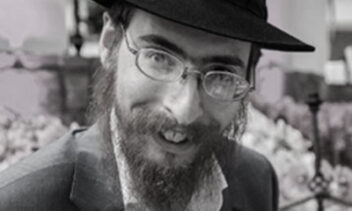In Rabbi Jonathan Sacks’ To Heal a Fractured World, the late and great Rabbi Sacks shared a deeply moving teaching about the well-known line from Tehillim (37:25): “I was young and now am old, yet I have never seen the righteous forsaken or their children begging for bread.” The challenge of this verse is clear – many of us have seen the righteous forsaken, underappreciated, and suffering in this world. He points to the words of the poet Edmund Blunden, who wrote an ironic commentary on this verse:
I have been young, and am not too old;
And I have seen the righteous forsaken,
His health, his honour and quality taken.
This is not what we were formerly told.
In dealing with this contrast, between the Psalmist’s view and our own, Rabbi Sacks turns to a teaching by Mo Feuerstein, recounted by Rabbi Joseph B. Soloveitchik:
The verb ‘seen’ [ra’iti] in this verse, said Feuerstein, is to be understood in the same sense as in the book of Esther: ‘How can I bear to see [ra’iti] disaster fall on my people?’ (Esth. 8:6). ‘To see’ here means ‘to stand still and watch’. The verb should thus be translated, ‘I was young and now am old, but I never merely stood still and watched while the righteous was forsaken or his children begged for bread.’
This careful reading of the verse is touching in its own right, and deals directly with the gap between our view of the textual universe and the human universe. This is one face of what social responsibility, or social justice perhaps, can look like.
Here at 18Forty, we are only as good as the people we engage with. Our intellectual community means everything to us, and since our inception, we have been blessed with engaging with our readers and listeners and growing from that engagement. This week, we wanted to know what our readers think about social justice. This weighty term can mean different things to different people. We asked three questions, core questions that come up time and again in our thinking about this topic.
Question 1: Is there a theological imperative in Judaism to be involved in social justice?
Thinking about the first question, the theological imperative for social justice, our readers are divided:
Anonymouse, from Brooklyn, (we aren’t sure if it is a pun but we dearly hope it is) shared this:
With the imitatio dei mandate (and I think many other proof points), it would be hard to argue that there is no social-justice imperative in Judaism. The exact contours of what that imperative are hard to define.
A Lonely Soul of the World, hailing from Woodmere, NY, has a passionate response:
Yes! Our obligation to reveal Hashem in every aspect of the world — which is severely hindered through oppressive systems, racial injustice, and the physical destruction of Earth — is tantamount to everything. Talmud Torah is one such way to fight for social justice, as it sustains the entire world. We need to challenge our assumptions and stand up for everyone btzelem Elokim.
Josh from Brooklyn wins points for brevity:
No.
There you have it.
Question 2: Why does the Orthodox community seem to be so much less actively engaged in social justice work than other parts of the Jewish community?
Anonymouse, our possible punster, shared these thoughts:
1. The Orthodox community — especially certain segments of it — is fairly insular, and activities that would fit under the rubric of “social justice” (e.g. operating gemachs) are not necessarily widely publicized. So the Orthodox community may simply appear less engaged than do other streams, even though they are similarly engaged.
2. There are 24 hours in a day, and there are a finite number of priorities anyone can have. The Orthodox community is much more engaged in ritual and cultural Judaism than most of the non-Orthodox community, and often elevates these spheres as selfless. This leav[es] fewer opportunities — and, possibly, less passion — for social justice activities. A sizable number of Jewish men learn daf yomi. This endeavor can both A) take an hour out of their day (that might otherwise have been turned to social justice); and B) satisfy part of one’s inclination engage in altruistic activities.
3. Because of its insularity, the Orthodox community, on the whole, may actually see less value in social justice activities that benefit other communities.
A Lonely Soul in the World has sharper words:
The Orthodox community is mentally colonized. We see our (predominantly) white skin and forget that we are Semites, that we will never be white enough, and that Hashem entrusts us to lead the world toward a more God-conscious reality. Avodah Zarah permeates our world in the form of wealth, power, and a colonized state of being. We need to return back to Hashem and help the world’s soul break free of its chains that constrict its holiness and purity from within.
DRS Kid put it simply:
- They are insular.
- There is a lot of casual racism that we need to acknowledge and combat.
Question 3: Does belief in Jewish chosenness allow for broad social activism?
A Lonely Soul, in the idiosyncratic style that we have learned to love from them, says this:
Absolutely. Our modern conceptions of “betterness” revolve around superficial notions. When one compares the partner of a law firm with a custodian, we only see them through the World of Asiah (action) and Olam HaZeh (this world), planes of reality that are measurable and quantifiable. As such, we see the law firm partner with a greater influence and more prestige, so we associate that with value. However, what Rav Kook and Kabbalah teach us is that we are all neshamot, and the difference in our functions as people only allows us to shine a unique light unto the world — not one that’s better or superior, merely one that’s unique and authentic to ourselves. The Jewish People are the organizers, as Rav Kook describes, they gather the lights of all the nations and shine them together to form the rainbow of peace, love, humanity, and Hashem.
Josh disagrees:
It doesn’t matter. As Jews, we believe that we are not allowed to tear off a fruit or flower just for fun because it has a life, that being said, we have to care for a fellow human no matter of his or her color, race, religion, or age. But for activism, that’s a different story…
We hope to continue to listen to our thinking community, and we hope you let us know what you think. Every month, we’ll be putting questions to you about the topic of the month. Let us know your thoughts. Challenge us, and let us challenge you.
In closing, we turn to Rabbi Sacks’ follow-up to Feuerstein’s teaching above. Read this story, internalize it, and accept its invitation to grow:
Back in Britain I heard little of the Feuersteins until a news-cutting caught my eye. In late 1995, the textile mill the family owned in Lawrence suffered a devastating fire – the worse in Massachusetts for more than a century. By then, most of the textile mills in New England had closed. There was cheaper labour to be had in Mexico, India, or Asia. Many assumed that the owner, Aaron Feuerstein, by then 70 years old, would simply take the opportunity to collect the insurance and close the mill. What caught the headlines was his principled decision not to do so. The business was a major employer in the town – 1,800 people worked in it – and he felt a strong sense of responsibility to them and their families. He announced, first, that the mill would be rebuilt; second, that for the next 60 days all employees would be paid their full salaries; third, that their health insurance had already been paid. It would be good to be able to say that virtue was rewarded. In strictly economic terms it was not: the business faced ongoing difficulties. But Aaron Feuerstein kept his word and became known as ‘the mensch of Malden Mills.’
This is a vision of social responsibility that marries a spiritual and intellectual appreciation with a real economic activism. This is an ideal to aspire to – not an easy story, with a ‘happily ever after’ ending, but a story grounded in dedication to humanity and sacrifice. Join us in thinking about social justice. We all have something to learn.








